
| January 2002 | ||||||
| Sun | Mon | Tue | Wed | Thu | Fri | Sat |
| 1 | 2 | 3 | 4 | 5 | ||
| 6 | 7 | 8 | 9 | 10 | 11 | 12 |
| 13 | 14 | 15 | 16 | 17 | 18 | 19 |
| 20 | 21 | 22 | 23 | 24 | 25 | 26 |
| 27 | 28 | 29 | 30 | 31 | ||
Wednesday 16 January
At 1200, EST the Training Ship Empire State was moored at the United States Naval Base Norfolk, Virginia preparing for departure. The sky was partly sunny, air temperature was 44 degrees Fahrenheit with 47 percent humidity, winds were from the Northeast at 05 mph, barometric pressure was 30.29 inches of mercury, and the sea injection temperature was 52 degrees Fahrenheit.
CAPTAIN'S LOG
"It doesn't matter how strong your opinions are. If you don't use your power for positive change, you are, indeed, part of the problem." Coretta Scott King
Norfolk, Virginia. Probably one of the oldest and proudest seafaring communities in the United States. Home of the US Navy Atlantic Fleet, the second busiest container port on the East Coast of the US, and some of the nicest people you would want to meet. We have been treated like valued relatives. From the politeness of the US Coast Guard when challenged at the port entrance, to the gatekeepers at the container terminal where we are docked - everyone has been valuable to our stay. Coming into port aboard the training ship at night is a little unusual...going out at night is even more unusual. But that may be the tenor of this voyage - different.
Right off the bat we see a different attitude in the ports of the United States. Coast Guard picket vessels at the harbor entrance, occasional overflights of helicopters and small planes. When we passed the US Naval base a large commercial tugboat came out and traveled with us. The tug's purpose was to keep us from "accidentally" ramming a US Naval vessel at their pier. They aiso had small buoys placed just off the piers, creating a "boundary" of their water, into which no one is allowed to enter. Coming and going from the terminal required presentation of identification. Vehicles are scrutinized, trucks have their Bill of Laden studied. There is a definite reaction to the terrorism last September. Aboard our ship, we too have taken additional steps to enhance a security system that we were always confident in. We now have added more on-deck watches to look out for approaching boats or persons. All persons must show ID cards. Official visitors from the ports are now challenged and identifcation is cross-checked against who we were told would visit the ship. It may be different, but it is still what we do. Learn-do-learn. Our training cruise will not be interrupted or stopped.
Our stay in Norfolk is proving to be quite fruitful.
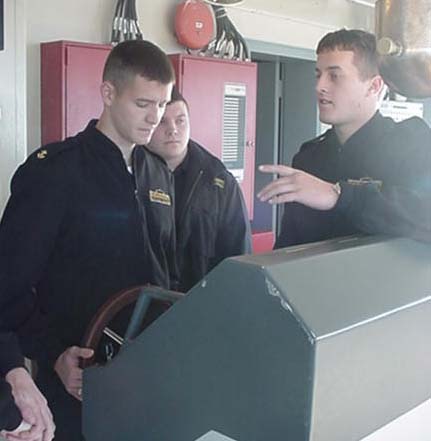
We are getting some excellent training, which is always a plus, shipboard maintenance is going very well, the weather is nice and we are taking full advantage of our close proximity to the Maritime Administration (MARAD) warehouses and the James River Reserve Fleet.
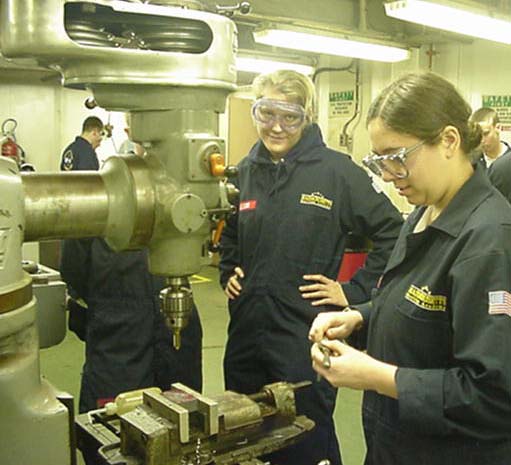 Operating a ship at sea requires a great deal of resourcefulness and the one who fails to plan for unfortunate eventualities is often made to suffer. Spare parts are always in short supply. Therefore, we have loaded cadets and staff into borrowed vans and trucks to plunder the ships awaiting break up. The inactive fleet sat unsuspectingly at anchor; the good 'ole ship TS Patriot State, the Cape Clear, Cape Charles, and Canso were primary targets. Our clandestine buccaneers slipped quietly aboard and scoured the decks and spaces for anything useable. Tools, consumables (mops, wax, oil, grease, etc.)and parts were the targets. Better to be put to use than cut up for scrap. Now, we are better prepared to meet the technical uncertainties of the remaining voyage and more certain of our success as well.
Operating a ship at sea requires a great deal of resourcefulness and the one who fails to plan for unfortunate eventualities is often made to suffer. Spare parts are always in short supply. Therefore, we have loaded cadets and staff into borrowed vans and trucks to plunder the ships awaiting break up. The inactive fleet sat unsuspectingly at anchor; the good 'ole ship TS Patriot State, the Cape Clear, Cape Charles, and Canso were primary targets. Our clandestine buccaneers slipped quietly aboard and scoured the decks and spaces for anything useable. Tools, consumables (mops, wax, oil, grease, etc.)and parts were the targets. Better to be put to use than cut up for scrap. Now, we are better prepared to meet the technical uncertainties of the remaining voyage and more certain of our success as well.
The crane installation has also proven quite successful. Technicians loaded the base, cab, and boom onto the stern yesterday, assembled them, and began to connect the hydraulic, electronic, and electrical systems. The boom control circuitry did not respond as required and that forced us into the troubleshooting mode but we systematically ruled out all problems and the Appleton is now operational. Remember, the crane installation is our reason for stopping here.

Now, all that remains is to recover our students who are afield at the Fire Fighting School and the Norfolk International Terminal, complete final pre underway checks, and cast off. We are planning to depart at 1900 this evening.
Everyone associated with our visit, including MARAD, the Norfolk Naval Base Port Services, the Pilots, etc. have made our brief stop very productive and they have my personal thanks. See you tomorrow from somewhere farther south.
CADET COMMENTS
By Cadet 3/C Carrie Bettencourt
Well, Cruise 2002 is off and rolling...literally. The storm that occurred this past Sunday was a walkup call for all who thought we were on a six-week pleasure cruise. SURPRISE! SURPRISE! It was reassuring to see how well everyone pulled together. Officers, crew, and cadets from fourth class up, performed duties, stood watches, and stepped up and took over for the many people affected by seasickness.
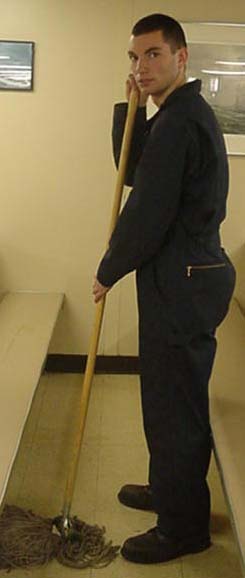
While some of the sick preferred to stay below in the holds, a number took up residence on the head floor. Other cadets ran to Sickbay and brought seasickness pills and packages of saltine crackers to comfort them (while dodging flying hardhats and other personal items that were not "secure for sea", I might add).
Between watches, cadets used their free time to help the nurses in Sickbay (which was definitely not secured!). They worked extra hours in the scullery,(have you ever had a plastic bowl come flying toward you at 20 miles an hour?), and spent extra time on the bridge or in the engine room. Without question, everyone truly went beyond the call of duty.
For the past three days, we have been docked in Virginia busily completing repairs and cleaning the ship. An antenna was replaced atop the bridge, some minor engine room machinery was fixed (the TG's are still functioning quite well, thank you), and the ship received a fresh water wash down. Cadets have continued in their classes and maintained watch rotations, which adds to the already busy schedule.
The International Maritime Business cadets had opportunities to tour the shipyard and the Norfolk International Terminal. The US Navy fleet is in and haze gray hulls surround the TS Empire State.
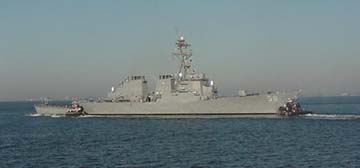
It is an amazing sight to look out and see helicopters, planes, and battleships both on the horizon and docked directly next to us! The Patriot State, MMA's previous training ship, is also berthed nearby.
Everyone is taking full advantage of the activities available to us here aboard. The library is open for those wishing to lose themselves in a good novel, Moby Dick, anyone? Movies play every night and no, A Perfect Storm is NOT one of them!
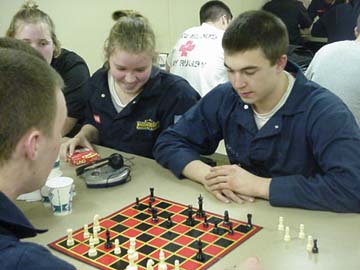
The gym offers cardio-kickboxing classes and a line of indoor rowing machines awaits those who want to add that little extra something to their workout.
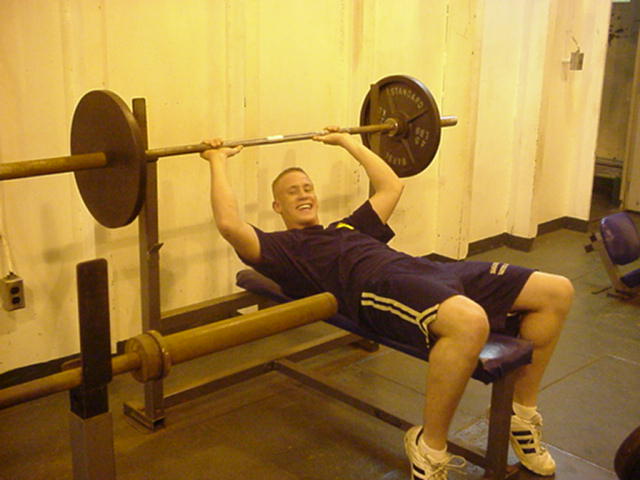
Today, we are preparing to shove off and head to the Caribbean (finally!). The promises of tropical islands (and Flying-A-Tours) are enough to motivate us to endure any ordeal, regardless the difficulty.
Norfolk has been an exciting port but time on the TSES has only just begun, and adventures of the sea and foreign lands await.
Quote of the moment: "A ship in harbor is safe, but that's not what ships are meant for..." -Author Unknown
QUESTIONS FOR THURSDAY, 17 JANUARY
MATH: During a violent storm and resulting rough seas, 20 percent of the cadets were seasick, 65 percent took motion sickness medication and were well, and the remaining cadets were not bothered seasickness. If there are 495 cadets aboard how many were sick, how many took medication, how many were not bothered.
SCIENCE: We know that the Chesapeake Bay is the nation's largest estuary. What is an estuary?
GEOGRAPHY: Which river does not flow through Pittsburgh? 1. Monongahela 2. Ohio 3. Allegheny 4. Susquehanna
HISTORY: Richmond, Virginia become Capital of the Confederacy and Virginia seceded from the Union. In what year did these events occur?
ANSWERS FOR WEDNESDAY, 16 JANUARY
MATH: OOPS! They haven't enough. The cooks will need 80 half-pint containers.
SCIENCE: A meteorograph is an instrument that records simultaneously, several meteorological conditions, such as temperature, humidity, and barometric pressure.
GEOGRAPHY: Atlanta, Georgia is located at 33 degrees 39 minutes 0 seconds North Latitude and 84 Degrees 25 minutes 11 minutes West Longitude.
HISTORY: President Lyndon B. Johnson signed the bill into law.